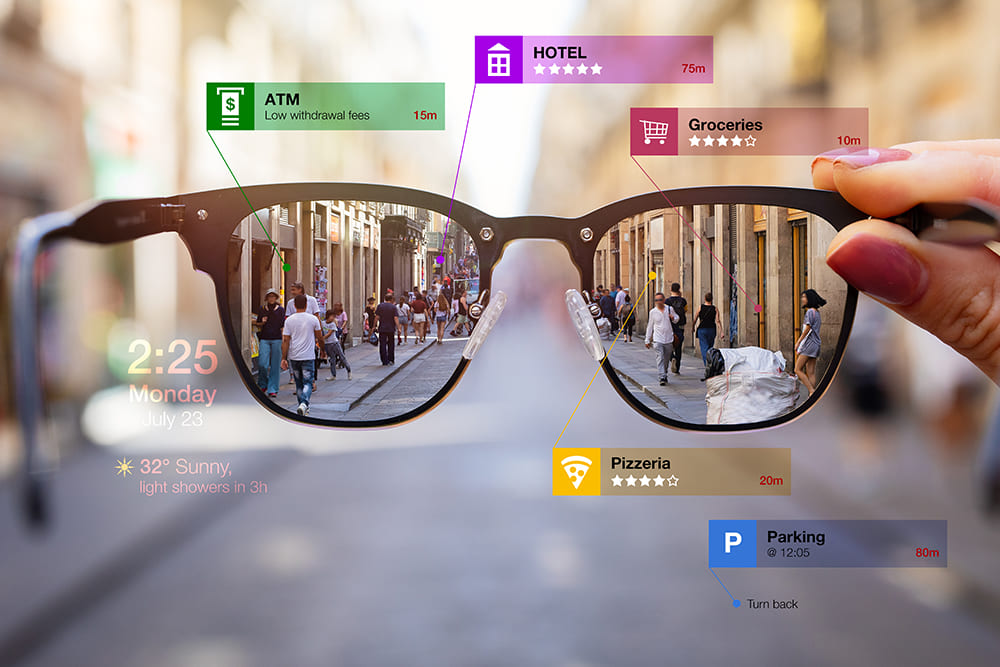Transforming Retail With Augmented And Virtual Reality, Powered By Artificial Intelligence: The Case Of Eyewear Shopping
2 July 2021
Remember the old days, when we had to shop for glasses in a tiny showroom in our optician’s office that only offered a limited selection?
You’d get your prescription from your doctor, then start picking up frames and trying them on at random. You had no idea what would look good on you, so your best option was to try on everything and hope for the best.

If your eyes are bad, trying on frames and trying to decide if they were suitable was extremely challenging – you might not be able to see your hand in front of your face without your prescription lens. How could you decide what frames to invest in by squinting in the mirror?
These days – especially in the midst of a global pandemic – we don’t want to make an appointment to visit an optician, then be confined to a tiny selection of glasses. We also don’t want to guess about what’s going to look good on us, or spend hours physically trying on frames.
The way we buy glasses is ripe for disruption. Now, with the help of virtual reality (VR), augmented reality (AR), and < title=" | Bernard Marr" alt=" | Bernard Marr"a class="color-link" title="https://bernardmarr.com/default.asp?contentID=1314" target="_blank" href="https://bernardmarr.com/default.asp?contentID=1314" data-ga-track="ExternalLink:https://bernardmarr.com/default.asp?contentID=1314">artificial intelligence (AI), the entire process of getting an eye exam and purchasing eyewear is changing radically.
VR headsets are evolving so quickly, and experts predict that soon they’ll be enabled with cameras that can deliver a 100% virtual eye test. The headset will be able to shine a light into the back of your eye to detect problems, as well as determine your prescription with precision.
Then the VR system will automatically deliver a digital prescription – you no longer have to worry about carrying around a paper prescription to give to a commercial retailer.
Once you have that prescription, you can enter a virtual showroom to “try on” frames and make a selection.
Warby Parker already leverages augmented reality to help their customers shop for glasses online.
They use the face-mapping features of Apple iPhones to help users put on virtual frames, similar to using SnapChat filters that let us add cat whiskers or ears to our faces. The glasses even stay on your face as you turn your head.
In this new “virtual try-on” world, powered by AR, you also get personalized recommendations that go far beyond the advice you’d get at an in-person optician’s showroom. With AI, online retailers can scan the shape of your face and make recommendations for frames that will look good on you.
The AI can even scan your social media profiles to get a sense of your style and preferences, then make recommendations for frames that will suit your personal style. With VR and AR, the entire process becomes far more customer-centric.
Instead of standing in a showroom feeling frustrated, then ending up getting glasses that don’t actually look good on you, you can select the perfect pair using a personalized, fun process enabled by AR, VR, and AI.
Where to go from here
If you would like to know more about , check out my articles on:
- Are Alexa And Siri Considered AI?
- How To Put AI Into A Business To Accelerate Performance?
- What Is The Impact Of Artificial Intelligence (AI) On Society?
Or browse the Artificial Intelligence & Machine Learning library to find the metrics that matter most to you.
Related Articles
8 AI Ethics Trends That Will Redefine Trust And Accountability In 2026
By now, “smart” versions exist of just about every home appliance, gadget and gizmos we can think of. However, manufacturers continue[...]
The 7 Banking And Fintech Trends That Will Define 2026
By now, “smart” versions exist of just about every home appliance, gadget and gizmos we can think of. However, manufacturers continue[...]
The 8 Biggest Healthcare Technology Trends To Watch In 2026
By now, “smart” versions exist of just about every home appliance, gadget and gizmos we can think of. However, manufacturers continue[...]
Why The AI Supercycle Will Fail Without Advanced Networks
By now, “smart” versions exist of just about every home appliance, gadget and gizmos we can think of. However, manufacturers continue[...]
The Two-Tier AI Economy: Why Half Of Companies Are Being Left Behind And How To Close The Gap
By now, “smart” versions exist of just about every home appliance, gadget and gizmos we can think of. However, manufacturers continue[...]
5 AI-Era Skills Mistakes That Will Cost Your Business Millions In 2026
By now, “smart” versions exist of just about every home appliance, gadget and gizmos we can think of. However, manufacturers continue[...]
Sign up to Stay in Touch!
Bernard Marr is a world-renowned futurist, influencer and thought leader in the fields of business and technology, with a passion for using technology for the good of humanity.
He is a best-selling author of over 20 books, writes a regular column for Forbes and advises and coaches many of the world’s best-known organisations.
He has a combined following of 4 million people across his social media channels and newsletters and was ranked by LinkedIn as one of the top 5 business influencers in the world.
Bernard’s latest book is ‘Generative AI in Practice’.










Social Media